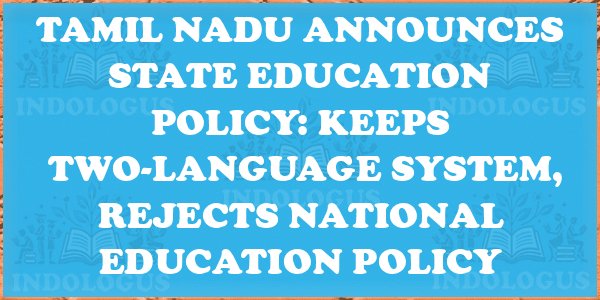In a significant move, Tamil Nadu Chief Minister MK Stalin unveiled the State Education Policy (SEP) at the Anna Centenary Library Auditorium in Kotturpuram, as a unique alternative to the National Education Policy (NEP). The state-specific policy reinforces Tamil Nadu’s commitment to its two-language system while introducing student-centric reforms.
Key Features of the Tamil Nadu State Education Policy
1. Two-Language Policy Maintained
- Tamil Nadu upholds its two-language system for all students up to Class 10.
- All boards, including CBSE and ICSE, will include Tamil in their curriculum.
- Rejects NEP’s push for three languages.
2. UG Admissions Without Common Entrance Test
- Undergraduate admissions for arts and science courses will consider combined marks from Class 11 and 12.
- No common entrance examination for these courses.
3. Opposition to Public Exams in Lower Classes
- Rejects NEP’s proposal for public exams in Classes 3, 5, and 8.
- Concerns raised about higher dropout rates, commercialization, and social justice impact.
4. Push for Science, AI, and English
- Focus on enhancing science education, artificial intelligence, and English proficiency.
- Significant investment planned for state-run educational institutions.
5. State Control Over Education
- Recommendation to shift education from the concurrent list to the state list for stronger state autonomy.
Funding Dispute with the Centre
The launch of the SEP coincides with the ongoing funding dispute between Tamil Nadu and the Union Government:
- Tamil Nadu alleges that the Centre has withheld ₹2,152 crore under the Samagra Shiksha scheme due to non-compliance with NEP.
- Union Education Minister Dharmendra Pradhan has tied fund allocation to the state’s acceptance of NEET and specific NEP provisions.
Key Takeaways for Competitive Exams
- Tamil Nadu’s State Education Policy maintains the two-language system and opposes the NEP’s three-language formula.
- Undergraduate admissions will rely on Class 11 and 12 marks, eliminating common entrance tests for arts and science courses.
- The policy rejects public exams in lower classes, emphasizing science, AI, and English education.
- There is a push for state control over education to enhance autonomy.
- The funding dispute with the Centre revolves around the withholding of funds under the Samagra Shiksha scheme.



